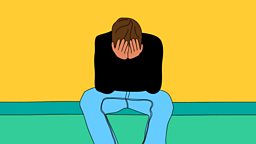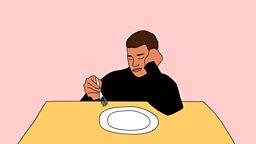Boys and eating disorders: 14 tips for parents

It’s not unusual to hear about girls and women who suffer from an eating disorder, whether it be anorexia or bulimia.
It’s rare to hear about a boy or a man, but the number receiving treatment has doubled in recent years.
The number of boys going to hospital in England, Scotland and Wales increased from 235 in 2010 to 466 in 2018, according to statistics from NHS Digital.
So what should parents do if they suspect a problem and where can they get help?
Samuel Pollen, who became anorexic when he was 12 and has written a book about teenagers with anorexia, discussed this on Woman’s Hour parenting podcast. He was joined by Professor Sandeep Ranote, a Consultant Child and Adolescent Psychiatrist at North West Boroughs Healthcare NHS Foundation Trust.
Here are their 14 tips for parents.

Tips from Samuel Pollen, author of The Year I Didn’t Eat.
“I had anorexia when I was about 12. It lasted a couple of years.
“I’m lucky that I had a relatively smooth recovery from that and I haven’t had any issues since. I’m 30, so for nearly two decades, I haven’t had an eating disorder.
“The crisis moment where my parents realised something was seriously wrong and I needed help, was when I got flu when I was 13. I was too weak to go upstairs or go to the doctors. We had to have a call-out doctor who referred me to the mental health services.
“My parents had been struggling to find a way to get me treatment before then.
“I have a really good relationship with food now...day-to-day I don’t worry about food, I eat what I want.”
1. Speak to a medical professional
“Go to a GP, have a conversation about it. I realise that it is an obvious tip but people are worried about that, they feel that...it’s not going to be serious enough and that can be a huge challenge.
“But I think that it’s not something you can tackle on your own and it’s something that’s incredibly hard to fix. The sooner it’s fixed, the better.”
2. Don’t make every conversation about food, eating and weight
“What was really helpful for me was that my parents kept a normal life around me, in so far as it could be normal. We played board games, we went to the park, we did normal family stuff.
“That ended up being really important because it gave me habits and things to do that weren’t just about food.”
3. Relationships with friends and others around you are very important
“There was a period of about a year where my friends would ask me if I wanted to play video games or if I wanted to go to the park...and I would say ‘no’ all the time.
“But they kept asking and my parents kept encouraging me to do those things and occasionally I did.
“That was really important because it maintained relationships that were then really important when I was recovering because I needed those people around me.”
4. Talk to your child’s school about their eating disorder
“School is a real challenge if you’re going through an eating disorder.
“Schools are more and more accepting of it and will help with it, and it’s important to talk to them about how to deal with it in a school environment. This would be in collaboration with medical services - it’s not something you should be making up on your own.
“One thing I did was I stopped doing games at school, I stopped doing sports, and I sat in the deputy headmaster’s office and did homework in the time that people were doing games.
“It was made very normal, very discreet, and I’m very grateful to my school and the deputy headmaster for making that happen.
“Kids are confronted around situations with food, lunchtimes...it’s inevitably a social experience, so having a plan for how to deal with that is really important.”
5. Other stories and other people’s experiences can be really helpful
“People who are going through eating disorders are incredibly resistant to that because they feel that their experience is like nothing anyone else has been through.
“But if you can find stories and find other people who have had the experience and been through it, it can be really helpful.
“It was really helpful for me that the psychologist that I saw, when I was being treated, had been through an eating disorder themselves. That support network of people who get it can be really helpful.”

Tips from Professor Sandeep Ranote, a Consultant Child and Adolescent Psychiatrist at North West Boroughs Healthcare NHS Foundation Trust
1. Don’t suffer in silence - speak to someone you trust
2. Eating disorders are real illnesses
“Remember you are not to blame and nor is your child”
3. Seek support as early as possible if you are worried
“What would you do if your son / daughter / loved one had diabetes? Approach this in the same way.”
4. Go to see your GP and / or the school
5. Get support through BEAT
“The national eating disorder charity has helplines to advise and help you to navigate treatment. They also have lots of resources to help you to understand eating disorders and know what to do next, including secure chat rooms to speak to others with lived experience.”
6. Access additional information through the NHS website and The Royal College of Psychiatrists
7. Understand the early warning signs of an eating disorder
There is more information about what to look for .
8. Hope is an important therapeutic tool
“There is hope and there is help. It is important that the whole family is involved in supporting the person with the eating disorder, but also that the whole family gets the support they need too.”
9. Eating disorders do not discriminate
“They can affect people of all ages, genders, ethnicities and social backgrounds.”
For more information about eating disorders and support, visit , the national eating disorder charity or the .
Listen to the Parenting Podcast from Woman's Hour for further tips and advice from Samuel Pollen and Professor Sandeep Ranote.



